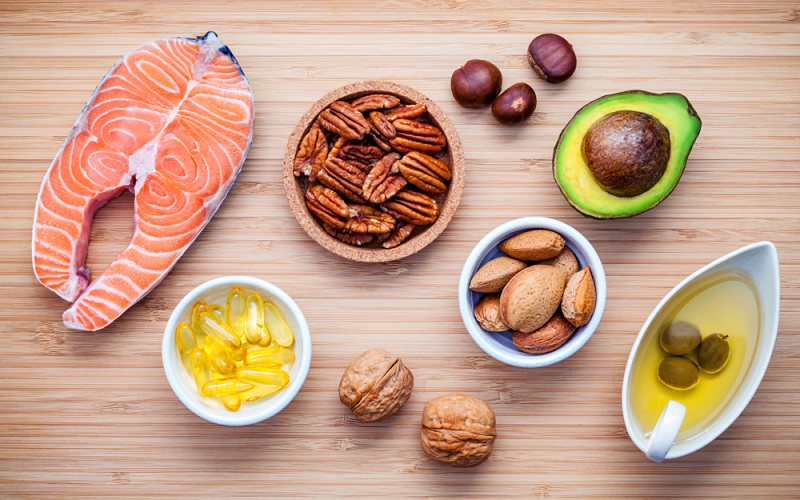Which Essential Fatty Acid Is Responsible for Lowering the Risk of Coronary Heart Disease?
Do you know which essential fatty acid is responsible for lowering the risk of coronary heart disease? Does the science check out? Or is it still fishy?
Continue reading to find out if your diet should get a fatty acid upgrade.
RELATED: Best Foods to Lower High Blood Pressure
Which Essential Fatty Acid Is Responsible for Lowering the Risk of Coronary Heart Disease?

What Is Omega 3?

Omega-3 fatty acids are essential nutrients you can find in fish, flaxseed, and walnuts.
They're considered essential because your body cannot produce them. So the only way to get them is through omega-3 foods.
The three most significant types of omega-3 fatty acids are:
- Alpha-linoleic acid (ALA)
- Docosahexaenoic acid (DHA)
- Eicosapentaenoic acid (EPA)
The body mainly uses ALA as an energy food. It also converts to DHA and EPA but in very limited amounts. So the best way to get your daily dose of DHA and EPA is through your diet.
These fatty acids are important to the structure of your cell membrane. You can find DHA in your eyes, brain, and sperm cells.
EPA and DHA are lifetime fatty acids, playing tremendous roles from fetal development to healthy aging.
They first started gaining attention when observational studies that populations that ate fish regularly had fewer incidences of heart attack or heart disease. Further research showed that populations with fish-rich diets or those who had high plasma levels of omega-3s faced a lower risk of heart disease and heart failure.
What Are the Omega-3 Benefits for Heart Health?

Research shows that omega-3s may keep your heart healthy and protect you from heart disease:
- may lower blood pressure, lowering the risk of heart disease
- may lower triglyceride levels
- may have anti-inflammatory properties
- may improve the cardiovascular risk profile of patients with metabolic syndrome
- may keep arteries healthy, preventing plaque from forming
- may lower risk of death in patients with heart disease
- may have antiplatelet properties
Other studies show that omega-3 could be beneficial for brain health, possibly protecting you from Alzheimer's disease.
It's also not clear how much fish oil you need to take to reap its benefits. But one systematic review found that it may take up to 4g per day to have any significant effects.
However, keep in mind that while research so far has been promising, there are also studies with conflicting results. And it seems with more answers come more questions.
RELATED: 11 Essential Oils For High Blood Pressure
What Does Science Say About It Now?

Recent research found that long-term omega-3 use might increase your risk of atrial fibrillation.
Atrial fibrillation happens when your heart beats irregularly and blood doesn't flow as it should. It could lead to a blood clot, pulmonary embolism, or even stroke.
The study found that the risk is higher with dosages over 1g per day.
Because of this, doctors are more cautious before prescribing fish oil to their patients.
However, omega-3s might still be a great partner in heart health.
The American Heart Association (AHA) advises heart disease patients to take 4g of omega-3 (EPA+DHA or EPA only) a day. They add that it's safe and effective in lowering triglyceride levels.
They also say that if you're a healthy individual, you don't need to take supplements. Getting essential fatty acids from your diet is enough.
One or two servings of fatty fish—especially in place of unhealthy foods—could give you a heart-health boost without the capsules.
If you're healthy and are convinced of the powers of omega-3, you can get it from a balanced diet! But if you're at risk of heart disease, talk to your doctor about it.
What Is the FDA’s Take On Omega-3 Benefits?

The Food and Drug Administration (FDA) has only two things to say about fish oil supplements and omega-3 benefits—inconsistent and inconclusive. While the FDA agrees that current research supports the claim that omega-3 may be great for heart health, they also add that they can't conclude that omega-3 is, in fact, heart-healthy.
Fish oil supplements and omega-3 capsules are also poorly regulated. And keep in mind that scientists still aren't sure exactly which omega-3 fatty acids are helpful and which may do more harm than good. Since the science is still murky, consult your doctor before taking omega-3 capsules or supplements.
Also, keep in mind that they might interact with your condition or medication.
Omega-3 side effects also include:
- headache
- foul-smelling sweat
- a bad taste in your mouth
- bad breath
- upset stomach
- nausea
- heartburn
- diarrhea
But you might only experience omega-3 side effects if you consume over 5g a day of EPA+DHA.
How Do You Incorporate Omega-3 Fatty Acids into Your Diet?

While scientists fish for the truth on omega-3 fatty acids, stick to omega-3 foods. (At the end of the day, nothing beats a balanced diet.)
The National Academy of Medicine doesn't have enough data on omega-3s, so they recommended amounts based on healthy populations. They also do not have recommended amounts for EPA and DHA alone.
The recommended amounts of ALA are per age group are:
- male, 19 years and above – 1.6g
- female, 19 years and above – 1.1g
- pregnant, 19-50 years old – 1.4g
- lactating, 19-50 years old – 1.3g
What Foods Are Rich in Omega-3 Fatty Acids?

If you're not a fan of popping pills, you can just as easily reap the benefits from a fish-rich diet!
Foods rich in omega-3 include:
- flaxseed oil
- chia seeds
- English walnuts
- Atlantic salmon
- Atlantic herring
- canola oil
- sardines
- Atlantic mackerel
- pink salmon
- soybean oil
- rainbow trout
- black walnuts
- oysters
- sea bass
According to the AHA, 1-2 servings of fish a week may lower your risk of:
- congestive heart failure
- heart disease
- ischemic stroke
- sudden cardiac death
But don't get too excited at the fish section at the grocery either! Eating too much fish could lead to mercury poisoning.
According to the FDA, fish that contain the highest amounts of mercury include:
- king mackerel
- marlin
- orange roughy
- shark
- swordfish
- tilefish
- tuna, bigeye
Check out this video to learn more about what omega-3s can do for you:
So which essential fatty acid is responsible for lowering the risk of coronary heart disease?
Omega-3 foods and supplements may benefit those at risk of heart disease. They may help lower your blood pressure and even improve the outcome of patients already diagnosed with heart disease. When asked about omega-3 supplements and capsules, the FDA and AHA rave about its potential benefits.
But if you're a healthy person, better get them from your diet. One or two servings a week of fatty fish will give you the benefits of omega-3s. However, if you want to explore fish oil supplements, consult your doctor first.
Their side effects are mild and are only likely to happen with very high doses. This could be your new, inexpensive partner to heart health.
Are you convinced of the benefits of fish oil? Or does it still seem fishy to you? Share your thoughts in the comments section below! We'd love to hear from you.
Up Next:
- 17 Foods to Lower High Blood Pressure Without Medication
- What Medications Can Raise Blood Sugar Levels?
- Why Good Nutrition and Physical Fitness Is Vital to Good Health?
Join the healthy living conversation with us on Facebook, Instagram, and Pinterest. We want to hear your story—let’s connect via these channels. Find our community online and join the healthy living revolution today!
Trending
Get Updates
SIGN UP FOR OUR NEWSLETTER TODAY

Lecithin Benefits and Side Effects: 10 Surprising Truths


